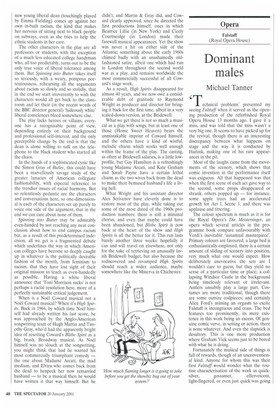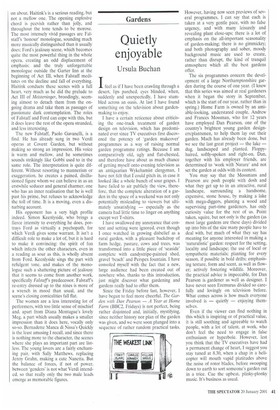Falstaff (Royal Opera House)
Dominant males
Michael Tanner
Technical problems' prevented my seeing Falstaff when it served as the opening production of the refurbished Royal Opera House 13 months ago. I gave it a miss, and was told that the miss wasn't a very big one. It seems to have picked up for the revival, though there is an interesting discrepancy between what happens on stage and the way it is conducted by Haitink, making one of his rare appearances in the pit.
Most of the laughs came from the movements of the scenery, which shows that comic invention in the performance itself was exiguous. All that happened was that when the first scene of each act gave way to the second, some props disappeared or shrank, others popped up — for instance, some apple trees had an accelerated growth for Act I, Scene 1, and there was applause and tittering.
The colour spectrum is much as it is for the Royal Opera's Die Meistersinger, an opera which several articles in the programme book compare unfavourably with Verdi's inevitable 'autumnal masterpiece'. Primary colours are favoured, a large bed is enthusiastically employed, there is a certain amount of sliding of scenery into position, very much what one would expect. How deliberately unevocative the sets are I wouldn't care to guess, but they yield no sense of a particular time or place; a collapsing Windsor Castle in the background being timelessly relevant or irrelevant. Antlers unsubtly play a large part. Costumes are more traditional, though there are some outsize codpieces; and certainly Alice Ford's miming an orgasm to excite Falstaff is incongruous and crass. The bed features too prominently, its mere existence in this work being an excess. Of genuine comic verve, in setting or action, there is none whatever. And even the slapstick is desultory. This is one more production where Graham Vick seems just to be bored with what he is doing.
Fortunately the mukcal side of things is full of rewards, though of an unconventional kind. Anyone for whom this was their first Falstaff would wonder what the routine characterisation of the work as quick silver, gossamer, effervescent, light-fingered, or even just quick was going on about. Haitink's is a serious reading, but not a mellow one. The opening explosive chord is peevish rather than jolly, and throughout the tone tends to be morose. The most intensely vivid passages are Falstaff s 'honour' monologue, sounding much more musically distinguished than it usually does; Ford's jealousy scene, which becomes quite the most powerful thing in the whole opera, creating an odd displacement of emphasis; and the truly unforgettable monologue outside the Garter Inn at the beginning of Act III, when Falstaff meditates on the decline and fall of everything. Haitink conducts these scenes with a full heart, very much as he did the prelude to Act III of Meistersinger, broodingly, seeming almost to detach them from the ongoing drama and take them as passages of passionate dark contemplation. The roles of Falstaff and Ford can cope with this, but it does leave the rest of the opera stranded, and less interesting.
The new Falstaff, Paolo Gavanelli, is a find. He has already sung in two Verdi operas at Covent Garden, but without making so strong an impression. His voice is warm and mellow, and he sometimes sounds strikingly like Gobbi used to in the same role. The interpretation is quite different. Without resorting to mannerism or exaggeration, he creates a pained, disillusioned figure whom we can believe in as an erstwhile seducer and general charmer, one who has an inner realisation that he is well past his prime, but refuses to acknowledge the toll of time. It is a moving, even a disturbing account.
His opponent has a very high profile indeed. Simon Keenlyside, who brings a fierce intensity to everything he does, portrays Ford as virtually a psychopath, for which Verdi gives some warrant. It isn't a difficult role to make a lot of, but it is hard to make it convincing: the spirit of fun which infects the other characters, even in a reading as sour as this, is wholly absent from Ford. Keenlyside sings the part with refulgent tone, and makes of the monologue such a shattering picture of jealousy that it seems to come from another work, specifically Falstaff s predecessor. Falstaff s re-entry dressed up to the nines is more of a wrench in mood than usual, and the scene's closing comicalities fall flat.
The women are a less interesting lot of performers, with too little sense of mischief and, apart from Diana Montague's lovely Meg, a part which usually makes a smaller impression than it does here, vocally only so-so. Bernadette Manca di Nissa's Quickly is the least amusing I recall, and since there is nothing more to the character, the scenes where she plays an important part are listless, The young lovers are a fairly enchanting pair, with Sally Matthews, replacing Jenny Grahn, making a cute Nanetta. But the balance of forces, if not of power, between 'genders' is not what Verdi intended, so that really only the two male leads emerge as memorable figures.































































 Previous page
Previous page